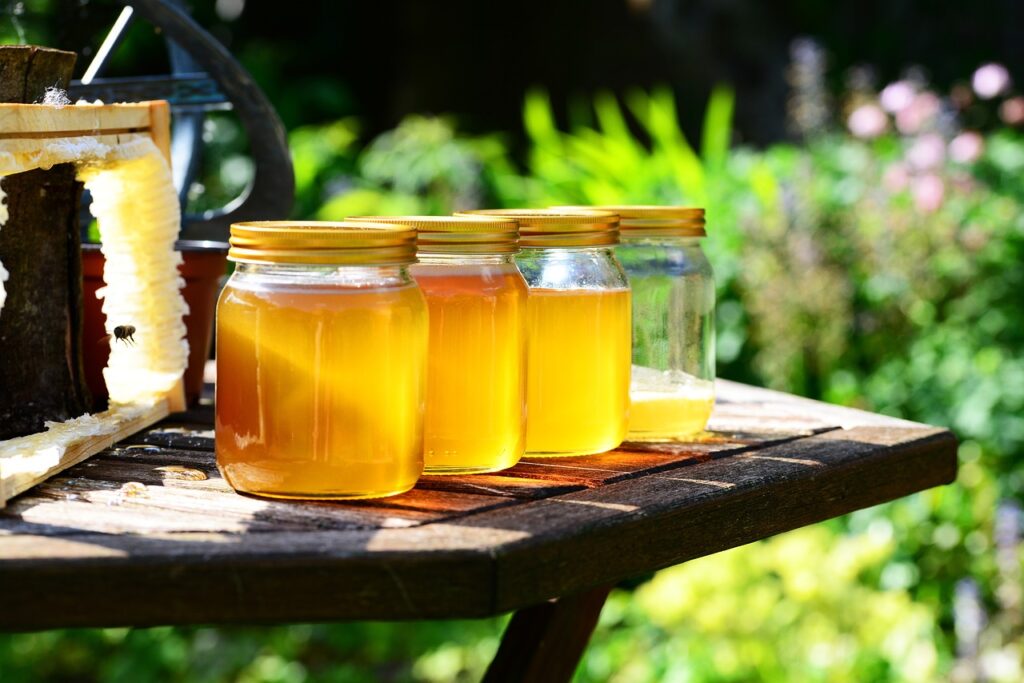Honey has been used for centuries not only as a natural sweetener but also as a traditional remedy for various health issues. With its unique properties and nutritional composition, honey has gained popularity as a superfood in recent years.
Honey nutrition is an essential component of a healthy diet as it contains essential vitamins, minerals, and antioxidants. Honey bees collect nectar from flowers, which they then convert into honey through a process of regurgitation and evaporation. This process gives honey its natural benefits, including its antibacterial and anti-inflammatory properties.
Let’s take a closer look at the nutritional value of honey and how it can support overall health and wellness.
Key Takeaways:
- Honey nutrition is essential for a balanced diet.
- Honey contains vitamins, minerals, and antioxidants.
- Honey’s natural benefits include antibacterial and anti-inflammatory properties.
The Nutritional Composition of Honey
Honey is a natural sweetener that provides a range of essential nutrients that are beneficial for human health. The nutritional value of honey depends on the flower nectar from which the honey is derived.
The major component of honey is carbohydrates, mainly in the form of fructose and glucose. Additionally, honey contains various vitamins and minerals, such as vitamin C, calcium, iron, and zinc. Honey is also rich in antioxidants, including phenolic acids and flavonoids. These antioxidants have potential health benefits, such as reducing inflammation and protecting against chronic diseases.
| Nutrient | Amount per 100 grams of honey |
|---|---|
| Calories | 304 |
| Carbohydrates | 82.4 g |
| Fat | 0 g |
| Protein | 0.3 g |
| Vitamin C | 0.5 mg |
| Calcium | 6 mg |
| Iron | 0.4 mg |
| Zinc | 0.2 mg |
Honey’s nutritional properties have made it a popular ingredient in many cultures around the world for centuries. In addition to its nutritional value, honey has natural benefits that make it a valuable addition to any diet. These natural benefits include its anti-inflammatory and antimicrobial properties, which are discussed further in other sections of this article.

Antioxidant Power of Honey
Honey is a natural source of antioxidants that may offer several health benefits. Antioxidants are substances that protect the body from free radicals, which are harmful molecules that can damage cells and lead to illness and disease.
One study found that honey contains a range of antioxidants, including flavonoids, phenolic acids, and enzymes. These antioxidants may help reduce inflammation and oxidative stress in the body, which are linked to the development of chronic diseases such as cancer, diabetes, and heart disease.
Types of Antioxidants Found in Honey
| Antioxidant | Function | Found in |
|---|---|---|
| Flavonoids | Reduce inflammation | Buckwheat honey, Manuka honey |
| Phenolic acids | Protect against oxidative damage | Buckwheat honey, Tupelo honey |
| Enzymes | Convert antioxidants into active forms | Raw honey |
Buckwheat honey and Manuka honey are among the types of honey that contain the highest levels of flavonoids, while buckwheat honey and Tupelo honey are rich in phenolic acids.
Potential Benefits of Honey’s Antioxidant Properties
The antioxidant properties of honey may offer several potential health benefits:
- Reduced risk of chronic diseases such as cancer and heart disease
- Protection against oxidative stress and inflammation
- Improved immune function
However, more research is needed to fully understand the potential benefits of honey’s antioxidant properties.
It’s important to note that not all types of honey have the same levels of antioxidants. The amount and type of antioxidants in honey can vary depending on factors such as the type of flower the bees collected nectar from and the processing methods used.
Overall, honey’s antioxidant properties make it a valuable addition to a healthy diet. Incorporating honey into your diet may offer several potential health benefits, including reducing the risk of chronic diseases and improving immune function.

Honey for Digestive Health
Honey has been recognized for its health benefits for centuries. One of the many benefits of honey is its ability to improve digestion. It contains enzymes that help break down carbohydrates, making it easier for the body to absorb nutrients from food. Additionally, honey has antibacterial properties that can help soothe and prevent digestive issues.
Researchers have also found that honey can be effective in treating gastrointestinal disorders such as acid reflux, gastritis, and stomach ulcers. Studies have shown that honey can help reduce inflammation in the digestive tract and promote the growth of good bacteria in the gut.
Honey for Soothing Digestive Issues
Honey can be particularly helpful in soothing digestive issues such as nausea, bloating, and diarrhea. The antibacterial properties of honey can help kill harmful bacteria in the gut that may be causing these symptoms. Honey also contains compounds that can help reduce inflammation in the digestive tract and soothe irritated tissues.
One effective way to use honey for digestive health is by mixing it with ginger. Ginger has long been used as a natural remedy for digestive issues, and combining it with honey can enhance its effectiveness. Simply mix a teaspoon of honey and grated ginger in hot water and drink it before a meal to help prevent digestive problems.
Honey for Promoting Gut Health
The bacteria in the gut play a crucial role in overall health, and consuming honey may help promote the growth of beneficial gut bacteria. Honey contains probiotics that can support the growth of good bacteria in the gut, which can lead to better digestion, improved immune function, and better overall health.
In addition to promoting the growth of good bacteria, honey can also help reduce the growth of harmful bacteria in the gut. The antibacterial properties of honey make it effective in fighting against harmful bacteria like E. coli and salmonella.
Overall, the benefits of honey for digestive health are significant. By consuming honey regularly, you can help improve digestion, soothe digestive issues, and promote overall gut health.
Honey’s Role in Energy Boosting
If you’re looking for a natural energy boost, honey is an excellent choice. Unlike refined sugars that can cause a crash shortly after consumption, the carbohydrates in honey provide a quick source of fuel for the body without the crash afterwards.
In fact, many athletes use honey as a pre- and post-workout meal to help improve performance and support recovery. Research has also found that consuming honey can improve endurance and reduce muscle fatigue during exercise.
Aside from athletes, anyone can benefit from incorporating honey into their diet for improved energy levels throughout the day. Honey can be easily added to smoothies, oatmeal, yogurt, or even spread on toast for a quick and easy snack.
Honey’s Role in Energy Boosting
If you’re looking for a natural energy boost, honey is an excellent choice. Unlike refined sugars that can cause a crash shortly after consumption, the carbohydrates in honey provide a quick source of fuel for the body without the crash afterwards.
In fact, many athletes use honey as a pre- and post-workout meal to help improve performance and support recovery. Research has also found that consuming honey can improve endurance and reduce muscle fatigue during exercise.
Aside from athletes, anyone can benefit from incorporating honey into their diet for improved energy levels throughout the day. Honey can be easily added to smoothies, oatmeal, yogurt, or even spread on toast for a quick and easy snack.
Immune System Support with Honey
As a natural antibacterial and antiviral agent, honey can play a role in supporting the immune system and preventing certain illnesses. The antioxidants found in honey, particularly flavonoids and phenolic acids, have been shown to have immune-boosting properties.
Additionally, honey’s antibacterial properties can help fight against harmful bacteria that can cause infections. Manuka honey, in particular, has been found to be effective against various strains of bacteria, including antibiotic-resistant strains.
Using Honey for Immune System Support
To reap the immune-boosting benefits of honey, it is best to consume it in its raw form. Heating or processing honey can destroy some of the beneficial nutrients and enzymes. Raw honey can be added to tea or used as a natural sweetener in recipes.
It is important to note that individuals with pollen allergies should be cautious when consuming honey, as it can contain pollen that may trigger allergic reactions. Additionally, honey should not be given to infants under one year of age as it may contain spores of botulism bacteria which can be harmful to their undeveloped digestive system.
Honey and Heart Health
Honey’s potential benefits for heart health are a topic of ongoing research, but some studies have suggested that the antioxidants in honey may help reduce the risk of cardiovascular disease.
One study found that consuming honey for just four weeks helped improve blood lipids, including reducing “bad” LDL cholesterol and increasing “good” HDL cholesterol. Another study found that consuming honey with a high antioxidant content helped decrease inflammation markers in the blood, which can contribute to heart disease.
It’s important to note that honey should not be relied upon as the sole solution for heart health. A balanced diet rich in whole foods, regular exercise, and other healthy habits can also contribute to cardiovascular wellness.
Honey as an Antimicrobial Agent
Honey has a long history of use as a natural remedy for wound healing and fighting bacterial and fungal infections. It has been shown to have broad-spectrum antimicrobial activity, meaning it is effective against a wide range of pathogens.
The antibacterial properties of honey are due to several factors, including its high sugar content, low pH level, and the presence of hydrogen peroxide. Honey also contains compounds such as flavonoids and phenolic acids that have antimicrobial activity. These compounds work together synergistically to create a powerful antimicrobial effect.
In addition to its antibacterial properties, honey has been found to be effective against some types of fungi and viruses. Its antifungal activity is thought to be due to the presence of compounds such as methylglyoxal and bee defensin-1. Meanwhile, honey’s antiviral properties are thought to be due to its ability to stimulate the immune system and inhibit the replication of viruses.
Overall, honey’s antimicrobial properties make it a valuable natural remedy for fighting infections. However, it is important to note that not all types of honey have the same level of antimicrobial activity. Manuka honey, for example, has been found to have particularly potent antimicrobial properties due to its high levels of methylglyoxal.
Honey and Weight Management
Honey can be a great addition to a healthy diet for those looking to manage their weight. Compared to processed sugars, honey is a natural sweetener that is packed with nutrients and has a lower glycemic index, meaning it causes a slower increase in blood sugar levels.
Additionally, honey may help promote satiety and control cravings, ultimately leading to reduced calorie intake. One study found that participants who consumed honey ate less overall compared to those who consumed sugar.
However, it is important to note that honey still contains calories and should be consumed in moderation. One tablespoon of honey contains about 64 calories, so be mindful of portions when adding it to your meals or drinks.
Overall, incorporating honey into a well-balanced diet can potentially support weight management goals and provide added nutritional benefits.
Choosing and Incorporating Honey into Your Diet
Now that you’re aware of the many health benefits of honey, you may be wondering how to incorporate it into your diet. Here are some practical tips:
- Choose raw, unprocessed honey for maximum nutritional value.
- Store your honey in a cool, dry place away from sunlight.
- Use honey as a natural sweetener in place of processed sugar in beverages, oatmeal, and baked goods.
- Add a spoonful of honey to plain yogurt or cottage cheese for a natural and nutritious snack.
- Replace sugar-laden condiments like ketchup or barbecue sauce with a homemade honey-based sauce.
- Try adding honey to marinades or salad dressings for a flavor boost.
Remember to enjoy honey in moderation, as it is still a source of calories. But incorporating it into your diet can provide a natural source of nutrients and may help support overall health.
Potential Risks and Precautions with Honey Consumption
While honey is generally considered a safe and nutritious food, there are a few potential risks and precautions to be aware of when consuming it.
Allergies
Some individuals may have an allergic reaction to honey. Although rare, symptoms can range from mild to severe and may include itching, swelling, and difficulty breathing. It is important to speak with a healthcare provider if you suspect you may have a honey allergy.
Risk of Botulism in Infants
The spores of the bacterium that cause botulism can be present in honey. While this is not harmful to adults or older children, infants under one year of age may be at risk of developing botulism if they consume honey. To prevent this, it is recommended that honey not be given to infants.
Moderation
While honey does offer many health benefits, it is important to consume it in moderation. Honey is still a source of calories and can contribute to weight gain if consumed in excess. Additionally, consuming too much honey may lead to digestive issues such as bloating or diarrhea. As with any food, it is recommended to enjoy honey as part of a balanced and varied diet.
By being aware of these potential risks and taking the necessary precautions, you can safely enjoy the many health benefits of honey as part of a healthy diet.
Conclusion
Honey nutrition offers a wealth of health benefits that make it a valuable addition to a balanced diet. With its unique nutritional composition, honey provides a natural source of carbohydrates, vitamins, minerals, and antioxidants that can contribute to overall wellness.
Studies suggest that honey may support digestive health, boost energy, strengthen the immune system, promote heart health, aid in weight management, and even act as an antimicrobial agent. However, it is important to consume honey in moderation and be aware of potential risks, such as allergies and the risk of botulism in infants.
When choosing honey, it is important to opt for high-quality sources and store it properly to preserve its nutritional properties. Honey can be used in a variety of ways in the kitchen, from sweetening tea to enhancing marinades or dressings in cooking.
Incorporating honey nutrition into a healthy lifestyle can be a delicious and nutritious way to support overall wellness.
FAQ
Q: What are the health benefits of honey?
A: Honey has numerous health benefits, including its antioxidant properties, potential immune system support, digestion aid, role in energy boosting, potential benefits for heart health, antimicrobial properties, and potential role in weight management.
Q: What is the nutritional value of honey?
A: Honey is rich in carbohydrates, vitamins, minerals, and antioxidants. It is a natural source of energy and contains essential nutrients such as vitamin C, calcium, and iron.
Q: How does honey support digestive health?
A: Honey can soothe digestive issues, promote gut health, and improve nutrient absorption. Its natural enzymes and antibacterial properties can help maintain a healthy digestive system.
Q: How can honey boost energy levels?
A: The carbohydrates in honey provide a quick source of fuel for the body, making it an ideal addition to pre- and post-workout meals. Honey’s natural sugars provide a sustained release of energy.
Q: How does honey support the immune system?
A: Honey has antibacterial and antiviral properties that may help prevent and manage certain illnesses. It can support the immune system by fighting against harmful bacteria and viruses.
Q: Can honey benefit heart health?
A: The antioxidants found in honey may help reduce the risk of heart disease and improve cardiovascular health. Regular consumption of honey as part of a balanced diet can be beneficial for heart health.
Q: What makes honey an effective antimicrobial agent?
A: Honey has been used as a natural remedy for wound healing and fighting bacterial and fungal infections due to its antimicrobial properties. It can create an inhospitable environment for pathogens.
Q: Is honey helpful for weight management?
A: Honey can be a healthier alternative to processed sugars due to its natural properties. It may promote a feeling of fullness and help control cravings, making it a potential aid in weight management when consumed in moderation.
Q: How should I choose and incorporate honey into my diet?
A: When choosing honey, opt for raw and unprocessed varieties for the highest nutritional value. Honey can be used in various ways, such as a natural sweetener in drinks and recipes or as a spread on toast or pancakes.
Q: Are there any risks or precautions with honey consumption?
A: While honey is generally safe for most people, it is important to be aware of potential allergies and the risk of botulism in infants. Additionally, moderate consumption is advised due to its high sugar content.




